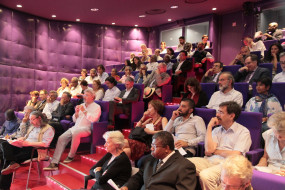News

Colloquim "the metamorphoses of State/Entreprise relations"
Wednesday 7th and Thursday 8th 2016 in the Simone Weil lecture hall at the Institute of Advanced Studies Nantes.
This conference will consider the metamorphoses of State/Enterprise relations from an anthropological viewpoint: “anthropological viewpoint” means here a “philosophical-historical” approach looking at the long-term and distancing itself from, without completely ruling out, an economy and politics-oriented approach.
The State and the Enterprise are thought of as institutions – or organisations (their definition is precisely part of the problem) – in their institutional, cultural and political dimension. The two notions State/Enterprise are not equal. There is a unity of State exercising sole authority over a territory, whereas there is a wide variety of companies, including public. Is a company an institution? What defines a company? Is it the right of free enterprise? And is the State defined by “public interest”? How far does public interest go?
State and Enterprise are producers of cultures, signs, rites, symbols, knowledge and social representations, such as the distinctions between “private/public” or “public interest/private interest”. The State has a broad mandate and embodies the public interest, public service, the nation or justice, while Enterprise embodies efficiency, profit and production.
However, the public sector is not limited to the central State: public authorities take many diverse forms. In France, the State seems almost sacred, even though it is becoming weaker, while big business is often the target of criticism or mixed emotions (love/hate), although it has tended to become stronger on a global scale.
These institutions or organisations are grounded in legitimacy and contribute to the way we think about society, or even provide us with turnkey thought processes. They produce intellectual, social and political “hegemony”. How are State and Company relations metamorphosising in a time of globalization and rapid and widespread technologisation of societies?
If you would like to take part in this conference, please fill in le formulaire d’inscription
Program:
Wednesday 7th December
> Session 1: State and Enterprise – genealogy of their relations
Alain Supiot (Collège de France): “State, Enterprise and democracy”
•Pierre Musso (Université Rennes 2 and IEA de Nantes): “Industrial religion and political religion”
> Session 2: State and Enterprise – the future of their relations
Romain Laufer (HEC), “State, Enterprise, Management: can we do without uncertainty?”
Michel Volle (X-ENSAE and doctor in history, economist, co-chair of the institute of economy): “Company anatomy: pathologies and diagnostics”.
> Session 3: The State, public interest and the public service
Jacques Fournier (Council of State): “Between State and enterprise: what future for the public service?”
Claude Riveline (Mines Paris), “The thousand faces of the State. Four level analysis”
> Session 4: Public service and public authority
Arnaud Teyssier (ENS/ENA), “The notion of sovereignty”
Jean-Christophe Gracia (HEC/ENA), “Judicial institution or public service of justice?”
Marc Chopplet (IAS-Nantes): “The State versus Enterprise: does it have the monopoly on violence?”
*************
Thursday 8th December
> Session 5: Management by numbers and accounting
Corine Eyraud (Université d’Aix-Marseille): “Accounting standards between public and private”
Samuel Jubé (IAS-Nantes): “Accounting standards and the promise of a non-state controlled economy"
> Session 6: Company, values and timeframes
Thibault Le Texier (Université de Nice): “A history of efficiency”
Pascal Feillard (PSA Peugeot-Citroën): “Enterprise and its timeframes"
Pascal Daloz (Dassault Systèmes): “Managing the unknown and scales of time in companies” (videoconference)
> Session 7: Enterprise, organization and power
Jean-Philippe Robé (member of the Paris and New York bar): “The role of enterprise in the system of power”
Baptiste Rappin (Université de Lorraine): “The organizational model and adaptable man”
> Round table chaired by Pierre Musso, 5.00-6.30pm: Public bodies and Enterprise: “Nantes’ style of play”
Johanna Rolland (Mayor of Nantes), Jean-Luc Charles (DG SAMOA), Frédéric Degouzon (Ecole de Design de Nantes), Laurent Eisenman (SNCF Pays de Loire), Yves Gillet (SCE), the President Nantes-Saint-Nazaire CCI.

